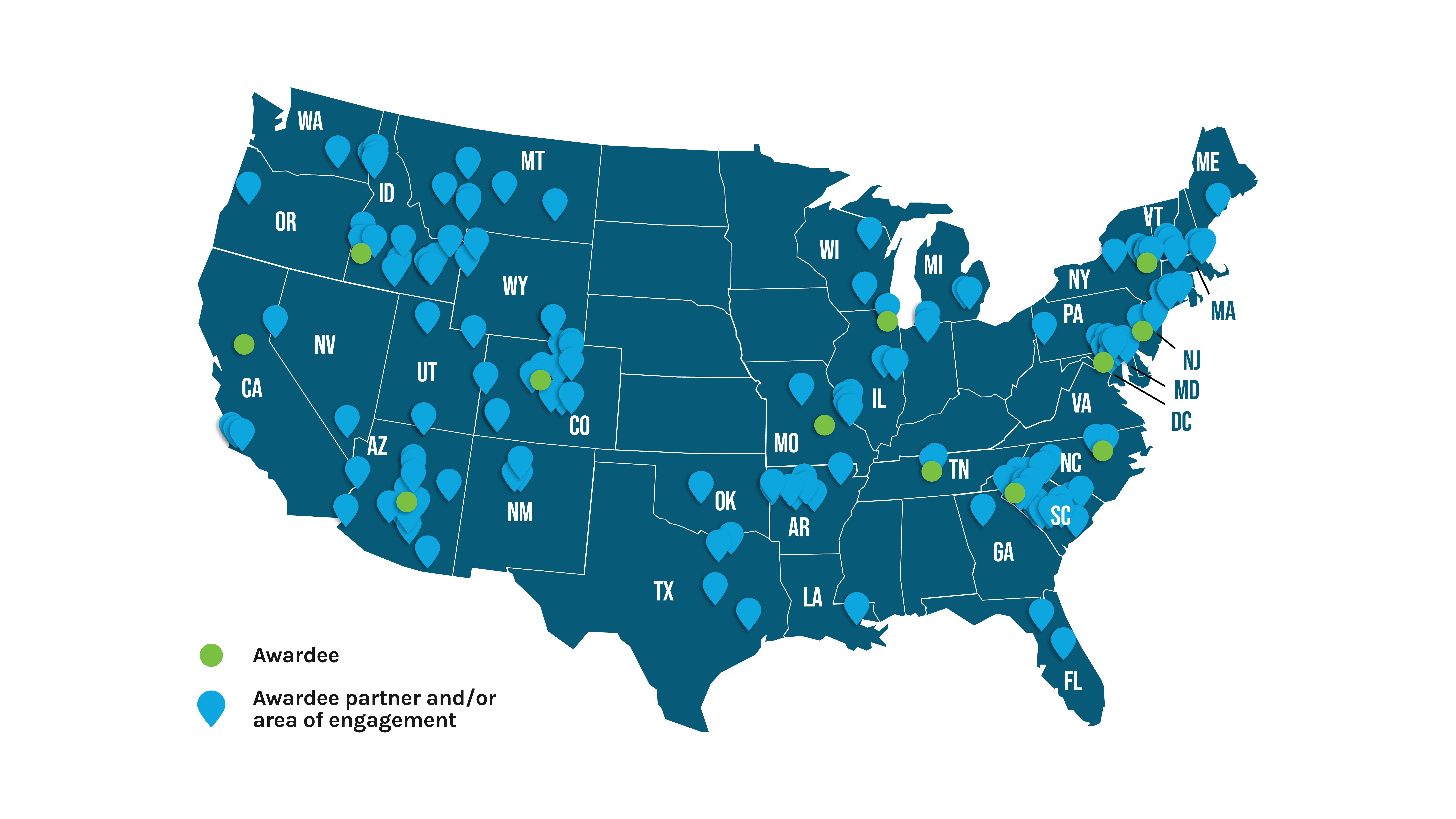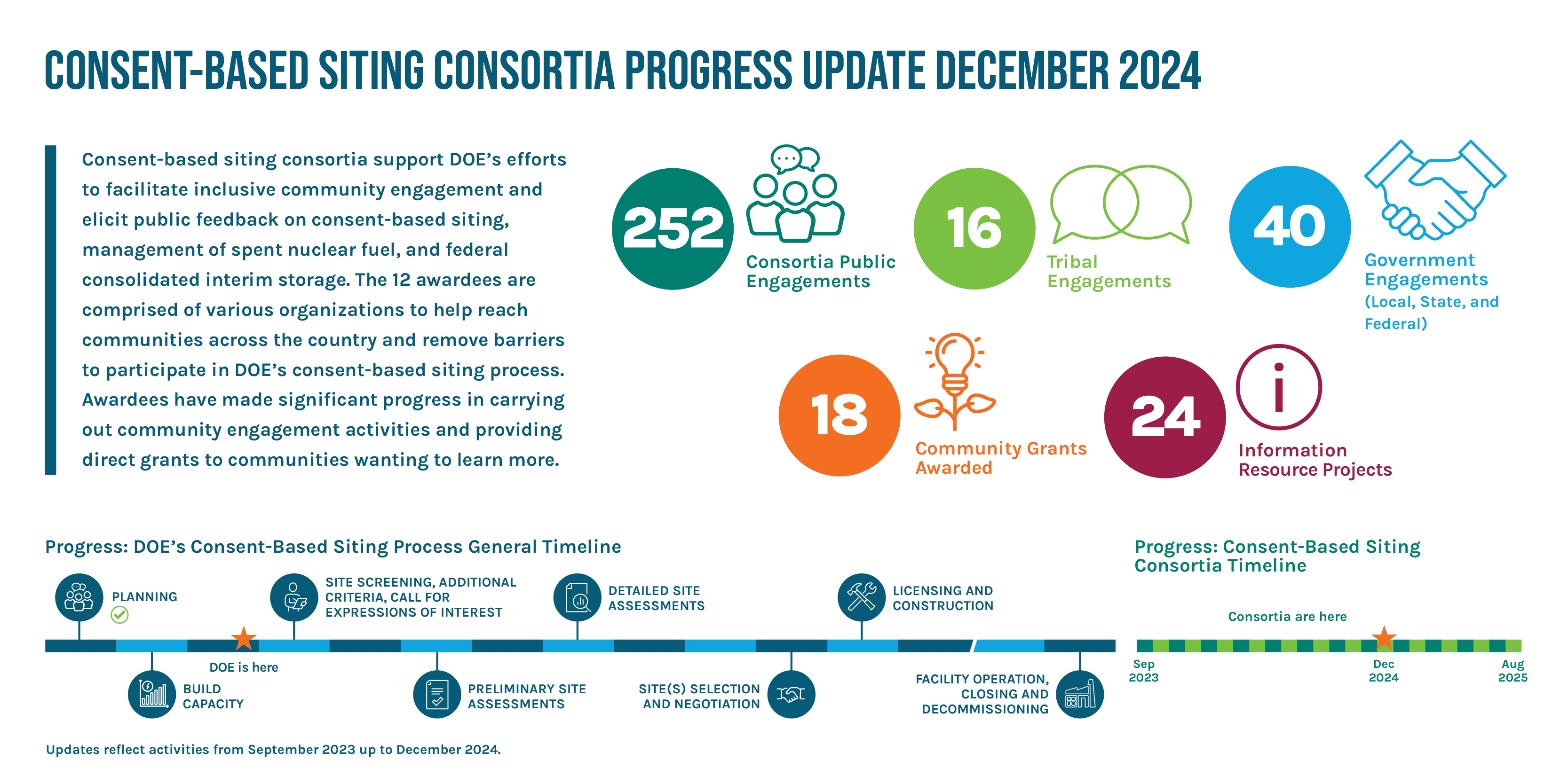
Locations identified on this map represent awardees, partners, or areas of engagement. DOE is not yet seeking volunteer host communities. This map is subject to change.
The Consent-Based Siting Consortia support the U.S. Department of Energy’s efforts to facilitate inclusive community engagement and elicit public feedback on consent-based siting, management of spent nuclear fuel, and federal consolidated interim storage. The 12 awardees are comprised of various organizations to help reach communities across the country and remove barriers to participate in the Department’s consent-based siting process.
Each awardee receives roughly $2 million to carry out community engagement activities and provide direct grants to communities wanting to learn more.
Consortia Progress Updates
Calendar of Events
Consent-Based Siting Consortia Awardees
Downers Grove, Illinois
Project Title: Asset-Based Collaboration for Effective Engagement in Consent-Based Siting
The American Nuclear Society will work with South Carolina Universities Research and Education Foundation and four minority-serving institutions to explore attitudes and values toward transportation and interim storage of spent nuclear fuel and high-level waste. Expected results are relationship building and a collaboration hub for constructive decision-making on nuclear waste strategies.
Contact: Andrew Smith
Project Information Quarterly Meeting 1
Project Information Quarterly Meeting 4
Tempe, Arizona
Project Title: Consortium for Community Engagement Innovation and Learning on Consent-Based Siting in Arizona
Arizona State University will work with local community partners to employ a method called Expert & Citizen Assessment of Science and Technology to consult and engage communities to assess public values related to consent-based siting. The goal is to create a testbed for public engagement innovations and capacity building that can be scaled to state and national levels.
Contact: Nicholas Weller or Mahmud Farooque
Project Information Quarterly Meeting 1
Project Information Quarterly Meeting 4
Boise, Idaho
Project Title: Common Ground – Legitimacy in Consent-Based Siting for Interim Nuclear Waste Storage
Boise State University is partnering with the National Tribal Energy Association and seven universities to establish a western-centered collaborative hub, or “network of networks.” The hub will be made up of communities with historical experience in nuclear technology, nuclear waste experts, and communities interested in learning about consent-based siting. The intended results are new course modules, stakeholder engagement tools, and a knowledge repository.
Project Information Quarterly Meeting 1
Project Information Quarterly Meeting 4
Clemson, South Carolina
Project Title: Empowering Collaborative Governance through Open Nuclear Waste Dialogue
Clemson University is partnering with South Carolina Universities Research and Education Foundation to engage in dialogue about spent nuclear fuel and high-level waste with South Carolina and Georgia communities by launching a series of public funding opportunities to support community action. Anticipated outcomes are tools, resource kits, and processes for robust stakeholder engagement and empowerment that are representative of diverse communities.
Contact: Lindsay Shuller-Nickles
Project Information Quarterly Meeting 1
Project Information Quarterly Meeting 4
Washington, DC
Project Title: Building Community Capacity to Achieve Consent
The Energy Communities Alliance plans to develop a framework for interacting with communities on storage and disposal of spent nuclear fuel and high-level waste by hosting roundtables, issuing community grants, providing technical assistance, and facilitating peer exchanges. The intended outcomes are to build trust and create a shared understanding of consent.
Contact: Kara Colton
Project Information Quarterly Meeting 1
Project Information Quarterly Meeting 4
Sacramento, California
Project Title: Early Engagement with Communities to Enable Procedural Justice and Capacity Building for the Siting of Federal Interim Nuclear Waste Storage Facilities
Good Energy Collective is partnering with the University of Notre Dame to host a series of workshops in three to five communities to identify perspectives on the consent-based siting process for one or more consolidated interim storage facilities (CISF). Participants will share their views on what they consider to be benefits and challenges of siting such facilities in a manner that would reflect community preferences and values. They will facilitate community workshops and meetings to identify and develop the types of technical, visual, and/or human resources that are most useful to answering participating community members’ questions about CISF siting, equipping participants with the resources they need to make informed determinations whether participating in the federal consolidated interim storage process is the right choice for their needs. The set of engaged communities will be geographically and socioeconomically diverse and will reflect a range of viewpoints and lived experiences.
Contact: Jessica Lovering
Project Information Quarterly Meeting 1
Project Information Quarterly Meeting 4
Mount Laurel, New Jersey
Project Title: Community Engagement Program for Consent-Based Siting of a Federal Consolidated Interim Storage Facility
Holtec International is partnering with University of Florida, McMahon Communications, Agenda Global, American Nuclear Society, and Nuclear Energy Institute to develop a thoughtful and sustainable engagement program by developing community-specific outreach plans. Anticipated outcomes are long-lasting, meaningful community relationships.
Contact: Ed Mayer
Project Information Quarterly Meeting 1
Project Information Quarterly Meeting 4
Keystone, Colorado
Project Title: Creating the Conditions and Capacity for Communities to Willingly Participate in Consent-Based Siting
Keystone Policy Center is working with the Social and Environmental Research Institute, National Association of Regional Councils, and GDF Watch to build knowledge and facilitate peer-to-peer learning to empower communities to engage on consent-based siting policy. The consortium plans to host regional workshops, provide direct grants to communities, and develop situational assessments. Potential outcomes are communities with enhanced capacity to engage in nuclear waste management discussions.
Contact:Brad Sperber
Project Information Quarterly Meeting 1
Project Information Quarterly Meeting 4
Rolla, Missouri
Project Title: Assessment after Engagement, Education, and Experiential-Learning
Missouri University of Science and Technology is partnering with the Taylor Geospatial Institute and three other universities to identify public perceptions of consent-based siting using an engagement process called Assessment after Engagement, Education and Experiential-learning. Expected results are tools, techniques, and procedures that will assist DOE in engaging with prospective host communities.
Contact: Shoaib Usman
Project Information Quarterly Meeting 1
Project Information Quarterly Meeting 4
Raleigh, North Carolina
Project Title: Community Engagement in Consent-Based Siting for Interim Storage
North Carolina State University is partnering with the yak titʸu titʸu yak tiłhini Northern Chumash Tribe of San Luis Obispo County and Region, Mothers for Nuclear, and the Tribal Consent Based Coalition to engage with communities interested in championing eventual interim storage for spent nuclear fuel. The consortium will lead a series of public meetings in urban areas as well as many smaller venues to interact with tribal communities. Potential outcomes are new community engagement capacity, strengthened relationships, and equitable decision-making processes.
Contact: Robert Hayes
Project Information Quarterly Meeting 1
Project Information Quarterly Meeting 4
Troy, New York
Project Title: Collaborative Paradigm for Community Engagement
Rensselaer Polytechnic Institute, along with the Schenectady Foundation, will develop a community engagement toolkit for the Department’s consent-based siting process through a participatory design process and evaluation of strategies for community engagement and mutual learning. The anticipated outcomes are a detailed guide of best practices for community-centered design, adaptable models for risk scenarios, plans for community engagement events, and learning modules.
Contact: Jim Olson
Project Information Quarterly Meeting 1
Project Information Quarterly Meeting 4
Nashville, Tennessee
Project Title: Improving Strategies for Community-Informed Decision-Making During Stakeholder and Tribal Engagement
Vanderbilt University will work with Rutgers University and Oregon State University to engage communities and tribal nations near existing U.S. Department of Energy-owned nuclear waste management facilities to foster mutual learning to understand the best and worst tribal and community engagement practices for risk-informed decision-making. The intended outcome is to create innovative approaches for knowledge sharing, deliberation, and values assessment.
Contact:Steve Krahn
Project Information Quarterly Meeting 1
Project Information Quarterly Meeting 4
Disclaimer: All product and company names used on this site are the trademarks of their respective holders. Reference herein to any specific commercial company, product, process, or service by trade name, trademark, manufacturer, or otherwise, does not necessarily constitute or imply its endorsement, recommendation, or favoring by the United States government or any agency thereof or its contractors or subcontractors.
Consortia Meeting Public Webinar #1 - 7/25/2023
Consortia Meeting Public Webinar #2 - 11/2/2023
Consortia Meeting Public Webinar #3 - 2/15/2024
Consortia Meeting Public Webinar #4 - 5/22/2024
Consortia Meeting Public Webinar #5 - 8/29/2024
Consortia Meeting Public Webinar #6 - 11/20/2024


